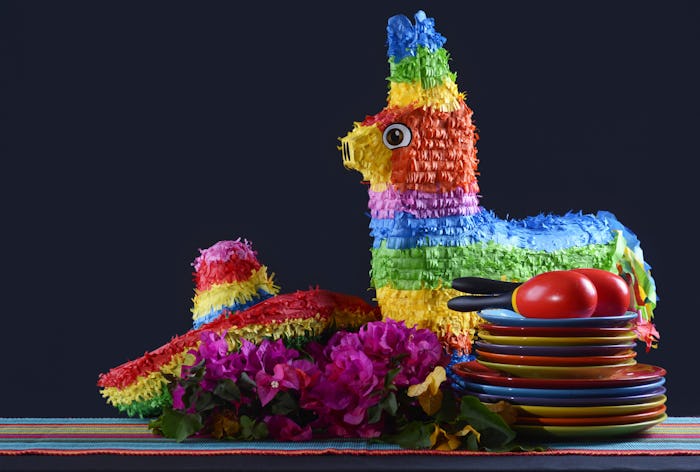Life

If You Don't Want Your Kid Involved In Cinco De Mayo Celebrations, Here's What To Do
May is here and one of the first celebrations of the month is Cinco De Mayo, which many Americans partake in as a tribute to Mexican culture. However, the holiday has a deep and complicated history, and "celebrations" involving tacos, fake mustaches, and sombreros do more harm than good when they simply reinforce damaging stereotypes and gloss over the origins and the meaning of the holiday. If you have school-aged children, and strive to give them a truly educated cultural perspective, you should know what to do if you don't want your kid to be involved in their school's Cinco De Mayo celebration.
Romper reached out to cultural diversity expert, Farhat Khan, who served as the director to the Chicago Public School’s Multicultural Resource Center and has been a grade school teacher for over 30 years. Khan says that if you are uncomfortable with your child celebrating in any school activity, including Cinco De Mayo, you simply need to let your child’s teacher and building administrator know your concerns. “You should reach out to the teacher, principal, or vice principal with a phone call or a letter,” she suggests, “and tell them that you want your child excluded from the activities.”
You can even ask the teacher to assign your child an age appropriate research project on the holiday instead, recommends Khan, so they can gain a more insightful and knowledgeable perspective on the holiday and its history. She says that over the years, in her own classrooms, she has used the holiday to teach her students about the historical events that led up to Cinco De Mayo and to nurture the appreciation for Mexican cultural heritage.
It’s important to understand how Cinco De Mayo came about, and how the holiday has evolved into something completely different. On May 5, 1862, the Mexican army defeated French forces in the Battle of Puebla, as noted by the Smithsonian, and was the first battle the French had lost in over 50 years. The French were trying to take over Mexico, the website explained, but an army of 4,000 Mexicans led by General Ignacio Zaragoza Seguín was able to defeat a French force of 8,000. In Mexico itself, Cinco De Mayo is generally commemorated in the state of Puebla, and is a pretty low key holiday.
So how did the day make its way to the United States? In a report by CNN, University of California at Los Angeles Professor David Hayes-Bautista explained that when the Battle of Puebla was won in 1862, Latino-Americans at the time heralded the win as a call to victory for the Union, which was enshrouded in its own battle with the Confederacy. He noted that during this time of Civil War in the United States, Hispanics sided with the Union due to their views condemning slavery and social injustice, and French sided with the Confederacy. So when the Battle of Puebla was won, Hispanics in the United States, mostly in the west, commemorated and celebrated the victory as a win for them as well.
In his book, El Cinco de Mayo: An American Tradition, Hayes-Bautista mentioned that Cinco De Mayo was honored by Union and Mexican army veterans for some years after the Civil War, and continued through the next few generations of Mexican immigrants as a “David and Goliath” type story. It wasn’t until the 20th century, noted Hayes-Bautista, that Cinco De Mayo was adopted by beverage companies, and turned into the celebratory holiday it has become.
Honestly, I never knew how much American Civil War history was tied into Cinco De Mayo, and all I remember learning in school was that it was a day to "celebrate" stereotypical Mexican culture. Teachers wore sombreros, played Mariachi music, and made us learn a few words in Spanish here and there, but the true importance of the day was never brought up. But I don’t remember anyone complaining or questioning much of anything back then, probably due the absence of Google and quick internet searches. Any historical or cultural questions would have to be found in specific history books or encyclopedias, and not many people wanted to take the time out to do that.
Luckily, times have changed, and with information at their fingertips, people are becoming more “woke” to cultural and historical perspectives being readily shared and understood. After gaining so much more insight into Cinco De Mayo myself, I can totally understand why some parents wouldn’t be keen on having their kids participate in activities that promote the commercialization of this important historical event and further cultural stereotypes. So, if this is the case for you, the first thing to do is reach out to your child’s school, and let them know your concerns.
Check out Romper's new video series, Bearing The Motherload, where disagreeing parents from different sides of an issue sit down with a mediator and talk about how to support (and not judge) each other’s parenting perspectives. New episodes air Mondays on Facebook.